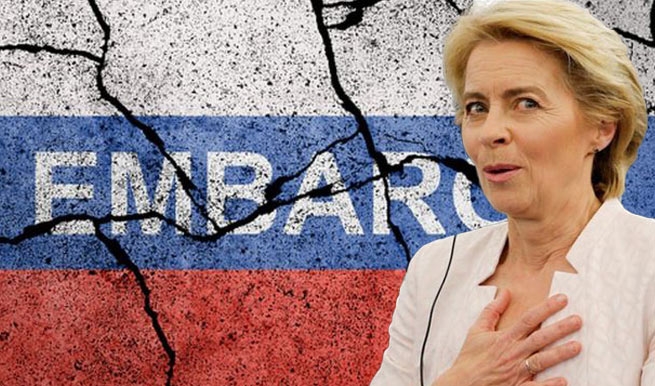On Friday, the European Union reached an agreement on a $60 per barrel cap on Russian oil, a key step as Western sanctions aim to reorganize the global oil market to prevent price spikes and deprive President Vladimir Putin of funding his war in Ukraine. .
After stormy negotiations, at the last minute, the presiding EU The Czech Republic tweeted that “ambassadors have just reached an agreement on a ceiling price for Russian offshore oil.”
Europe needed to establish a preferential price that other countries would pay until Monday, when the EU embargo on Russian oil supplies by sea and the ban on insurance of these supplies come into force. The price cap, proposed by the G-7 and Australia, and still awaiting their approval, is aimed at preventing a sudden loss of Russian oil in the world, which could lead to a new surge in energy prices and further inflation.
Poland has long obstructed the conclusion of an agreement, seeking to set the limit as low as possible. After more than 24 hours of deliberation, with other EU countries signaling they would support the deal, Warsaw finally gave in on Friday evening. At the same time, the Polish authorities managed to make an application for the purchase of 3 million barrels of Russian oil through the Druzhba gas pipeline, which is not subject to sanctions.
“Crushing Russia’s energy revenues is the basis for stopping the Russian war machine,” said Estonian Prime Minister Kaia Kallas, adding that she was pleased that the limit had been reduced by a few dollars from previous proposals. She said that every dollar the limit was lowered meant a $2 billion reduction in Russia’s military budget. “It’s no secret that we wanted the price to be lower,” Kallas added, highlighting differences within the EU. “A price between $30-$40 is something that would cause significant damage to Russia. However, this is the best compromise we could find.” .
The $60 figure sets the limit at the current price of Russian oil, which recently fell to $51 a barrel. Some have criticized the price as not being low enough to cut off one of Russia’s main sources of income. That’s still a big discount from international benchmark Brent, which traded at $86.68 a barrel on Friday, but it could be high enough for Moscow to keep selling even as it rejects the idea of a cap.
For the global oil market, there is a risk of losing large volumes of oil from the world’s No. 2 producer. This could lead to higher gas prices for drivers around the world, causing political unrest for US President Joe Biden and other leaders. Europe is already mired in an energy crisis, where governments are facing protests over soaring costs of living and developing countries are even more vulnerable to changes in energy costs.
But the West is facing mounting pressure on one of Russia’s main sources of income, oil, to cut funds flowing into Putin’s military purse and hurt the Russian economy as the war in Ukraine enters its ninth month. The cost of oil and natural gas soared as demand recovered from the pandemic, and then the invasion of Ukraine disrupted the stability of energy markets, adding to Russia’s coffers.
US National Security Council spokesman John Kirby told reporters on Friday that the price cap deal was welcome news, but declined to comment on details of the discussions in the EU. More uncertainty lies ahead. COVID-19 restrictions in China and a slowdown in the global economy could mean less thirst for oil. That is what OPEC and allied oil-producing countries, including Russia, pointed to when they cut world oil supplies in October. The next meeting of the OPEC+ alliance is scheduled for Sunday.
This competes with the EU embargo, which could lead to an increase in supply from the market, which means a squeeze on oil supplies and higher prices. Russia exports about 5 million barrels of oil per day. Putin has said he will not sell oil at marginal prices and will retaliate against countries that impose this measure. However, Russia has already diverted most of its supplies to India, China and other Asian countries at discounted prices, as Western buyers shunned it even before the EU embargo. Most insurers are based in the EU or the UK and may be required to participate in the restriction.
Russia can also sell oil against the rules, using “dark fleet” tankers with an unclear form of ownership (including Greek shipowners, which we wrote about yesterday). Oil can be transferred from one ship to another and mixed with oil of similar quality to hide its origin. Even under these circumstances, limiting the sale of oil bypassing restrictions on Russia would be “more costly, time-consuming and burdensome,” said Maria Shagina, a sanctions expert at the International Institute for Strategic Studies in Berlin.
Robin Brooks, chief economist at the Institute of International Finance in Washington, says the price cap should have been put in place when oil was around $120 a barrel this summer. “Obviously oil prices have fallen since then and a global recession is a real thing,” he said. “The reality is that this is unlikely to be mandatory given where oil prices are right now.”
Others have criticized the measure, the brainchild of US Treasury Secretary Janet Yellen. A spokesman for the US Treasury was not available for comment on Friday. Former Treasury Secretary Steve Mnuchin told CNBC in November at the Milken Institute’s Middle East and Africa Summit: “A price cap is not only unworkable, I think it’s the most ridiculous idea I’ve ever heard.”
[AP].







More Stories
Belarus is ready to fight, having adopted a new doctrine
IMF: "Huge US debt poses serious risk to global economy"
Teenager arrested in Paris: he wanted to “die as a martyr” at the Olympic Games (video)